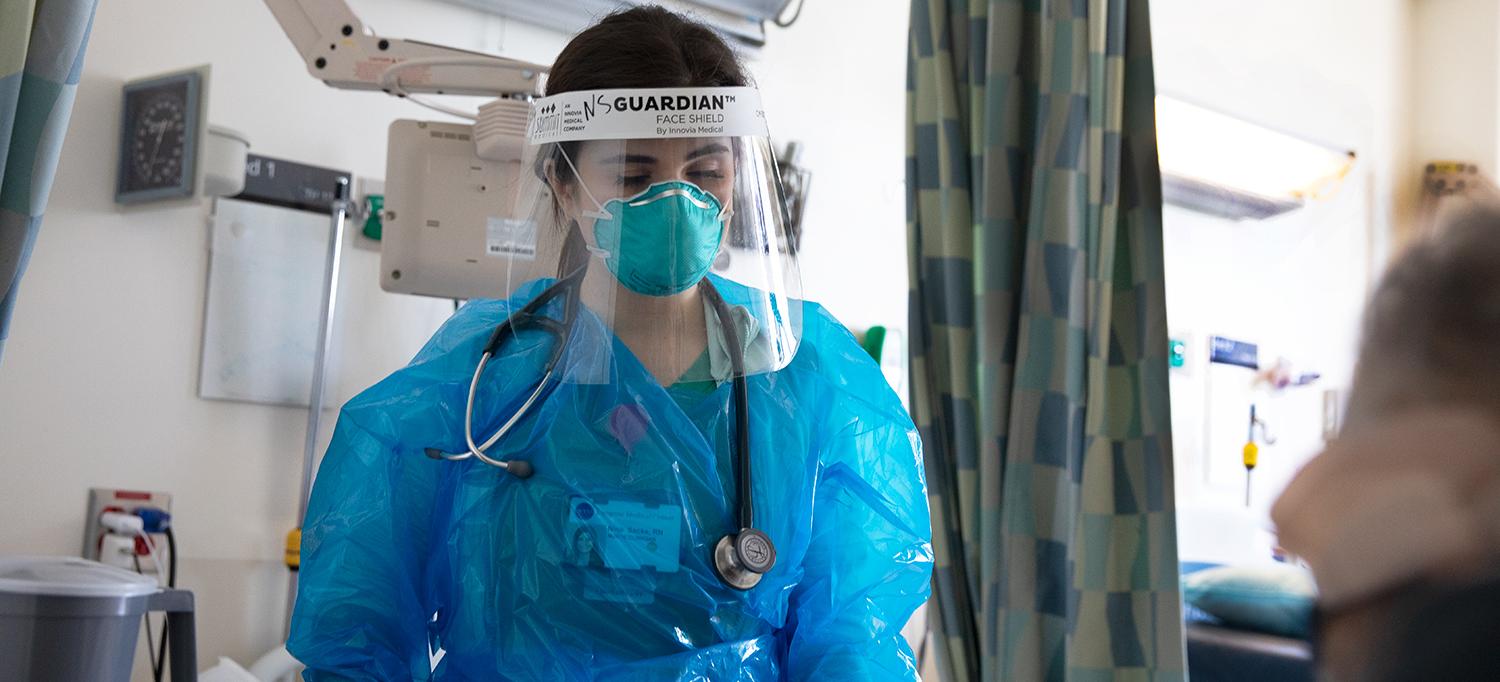
NYU Langone rheumatologists have joined in the fight against COVID-19, conducting studies to determine whether patients with autoimmune conditions are at increased risk of hospitalization.
Photo: Jonathan Kozowyk
Researchers have paid increasingly close attention to potential coronavirus disease (COVID-19) risks among patients with preexisting conditions or taking specific medications. Among patients with systemic lupus erythematosus (SLE) and inflammatory arthritis (IA), two new studies by NYU Langone Health clinicians have provided some valuable answers to two big questions. Immunosuppressants prescribed for the autoimmune conditions, they found, do not significantly alter the risk for worse COVID-19 outcomes. Nor do the patients themselves appear to have risk factors materially different from those of the general population, though expanding study cohorts will offer greater clarity.
Patients with Lupus and General Population Share Similar COVID-19 Hospitalization Risk Factors
When the COVID-19 pandemic hit New York, rheumatologists were flooded with phone calls and messages from worried patients with SLE or IA. No one knew for sure whether continuing with their medications would put the patients at higher risk for poor COVID-19 outcomes.
In one of the largest analyses of its kind, published in July in Arthritis and Rheumatology, research performed at NYU Langone concluded that for patients with SLE with PCR-confirmed COVID-19, variables predicting hospitalization matched those of the general population. “Our study shows findings similar to other studies: It doesn’t look like immunosuppressants, including biologic agents, significantly increase the risk of patients being hospitalized with COVID-19,” says first author Ruth Fernandez-Ruiz, MD, a postdoctoral fellow in the Division of Rheumatology. “I think that’s very reassuring.”
For the study, the researchers recruited and followed 226 adult patients with mild to severe lupus between mid-April and early June. Dr. Fernandez-Ruiz and colleagues recruited most of the patients from the well-established NYU Langone Lupus Cohort and supplemented that group with other patients identified via referrals or medical record queries. Of the 41 patients additionally diagnosed with COVID-19, 24 were hospitalized and 4 died. Although the small sample size limited strong conclusions about hospitalization and mortality predictors, Dr. Fernandez-Ruiz says the study did not identify any risk factors specific to SLE, such as taking mycophenolate mofetil, azathioprine, or other immunosuppressants, which were assessed in aggregate. In addition, patients with lupus taking hydroxychloroquine weren’t at any higher or lower risk of hospitalization.
The analysis did, however, identify being nonwhite, having a higher body mass index, and having at least one comorbidity as independent predictors of hospitalization. Although less conclusive, the study also suggested a trend toward higher risk among patients taking systemic steroids. “That’s something that will be very important to figure out,” Dr. Fernandez-Ruiz says, “but I would be more cautious with steroid use than with other medications and carefully balance the risk of active disease and flares against the risk of COVID-19.”
She and colleagues, including senior author Peter M. Izmirly, MD, associate professor in the Department of Medicine, are now expanding the size of their lupus study cohort to better understand the risks and potential mechanisms underlying susceptibility or protection. In addition, they’re assessing the SARS-CoV-2 antibody status of all patients with SLE to identify asymptomatic COVID-19 infections among the subset who never received PCR testing and to clarify any medication-associated risks.
No Higher Risk for Most Inflammatory Arthritis Therapies, but Caution Warranted for Glucocorticoids
For a separate study, also among the largest of its kind at the time of its July publication in Arthritis and Rheumatology, researchers found that patients with rheumatoid arthritis, psoriatic arthritis, or spondyloarthritis were no more likely to be hospitalized for COVID-19 than the general population in the New York City metropolitan region. In addition, the study concluded that those patients with IA on maintenance anti‐cytokine biologic therapies were not at higher risk of being hospitalized or having worse outcomes for COVID-19. “I think our study’s biggest impact is the idea that patients can safely stay on their medications to prevent a large portion of them from developing flares that could then lead to worse outcomes,” says first author Rebecca Haberman, MD, a clinical instructor in rheumatology.
Over a 2-month period, the researchers recruited 103 patients with symptomatic COVID‐19 infections who were being treated for IA. Of that total, 80 had a PCR-confirmed COVID-19 diagnosis; the other 23 had highly suspicious cases but weren’t tested. Of the 103 patients, 27 required hospitalization and 4 died. Those who did require hospitalization for COVID-19, the analysis found, were significantly more likely to be older or to have comorbid hypertension or chronic obstructive pulmonary disease—risk factors likewise observed in the general population.
The researchers, including senior author Jose U. Scher, MD, associate professor of medicine, did find an increased hospitalization risk associated with chronic steroid use, though Dr. Haberman cautions that the uncertainty due to the small sample size means more research will be required to determine the true risk. As a follow-up, she and colleagues are recruiting more patients with IA and COVID-19 to validate and refine their conclusions. As part of the expanding research, the investigators are taking nasal swabs and blood samples to measure the patients’ SARS-CoV-2 antibody levels and determine the overall infection prevalence.
Both Dr. Fernandez-Ruiz and Dr. Haberman cite the extensive research infrastructure at NYU Langone as a fundamental advantage in allowing them to launch their respective research projects so quickly, with additional financial support from the National Institutes of Health and multiple philanthropies. The team effort during a difficult time, Dr. Haberman says, made all the difference in getting the research out rapidly. “Most of us leading the study were serving hospital wards, taking care of COVID-19 patients as we did this research,” she says. “Yet in the midst of this crisis, we were still able to gather a lot of data that could aid other clinicians.”

